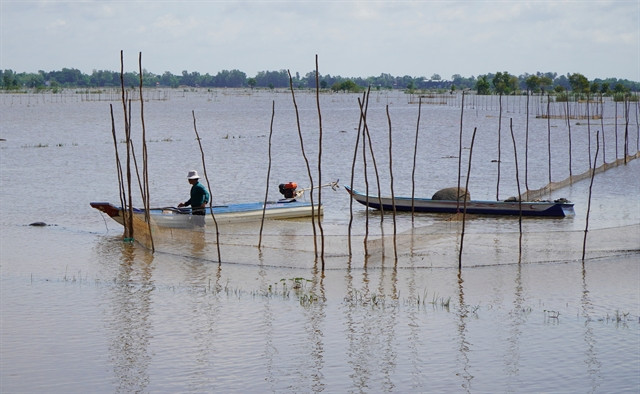 |
| Floodwaters flow into rice fields in Đồng Tháp Province’s Hồng Ngự District, bringing with them fish and other aquatic species. — VNA/VNS Photo Nhựt An |
The waters began to rise in the Tiền, a tributary of the Mekong and one of two large rivers running through the province, in the middle of August.
The flooding season in the Cửu Long (Mekong) Delta is normally between August and November.
After harvesting their summer-autumn rice, farmers in the upstream district of Hồng Ngự opened the sluices in fields last week to let the floodwaters in.
Besides bringing sediments that fertilise the soil, the floodwaters also bring in aquatic creatures.
In the district’s Thường Thới Hậu A Commune, farmers have started catching fish and others in the waters.
Lê Văn Lùn in Thường Thới Hậu A Commune has installed fish catching tools at his sluice gates.
The waters are still low and he is able to catch more than one kilogramme of various species every day, enough for his family’s requirements, he said.
Every year, the floodwaters are high in August and have a large quantity of fish, shrimp and other species, and he earns a good income, he said.
But this year, the level is 20cm lower than usual and farmers hoped it rises.
Lê Văn Đẹt in Hồng Ngự District said he has bought more than 100 items of equipment to catch crabs and is able to catch 10kg a day to earn VNĐ200,000 (US$8.4).
During the peak flooding season, he catches around 30kg, he said.
Many markets in Đồng Tháp are selling speciality flood season products such as linh (Cirrhinus jullieni) fish and điên điển (Sesbania sesban) flowers.
The fish and flower are used together to make sour and sweet soup, and the flower alone is used to make fermented pickles.
Trần Thị Diễm, who sells the speciality products in Thường Thới Hậu A, said farmers often catch fish and other aquatic species and sell them early in the morning.
She now buys 100kg a day, mostly of linh fish and sells them in the delta and HCM City, she said.
Linh fish is sold at VNĐ200,000 ($8.4) a kilogramme, and supply does not meet demand, she added. — VNS